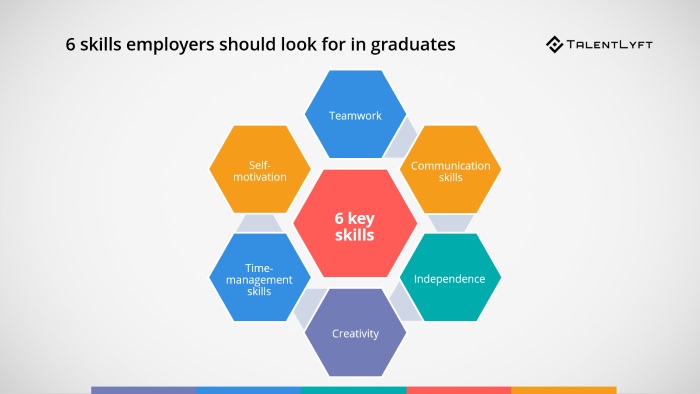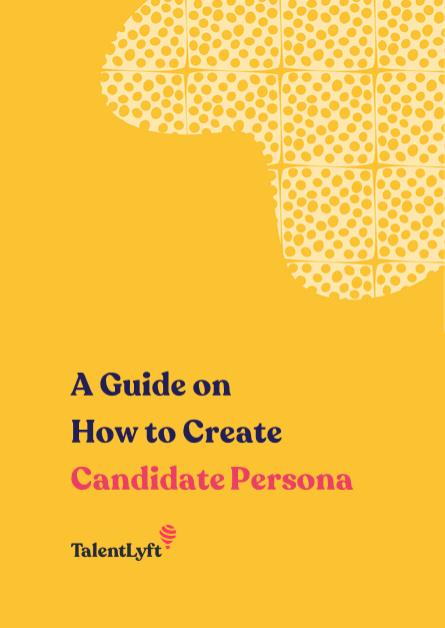![https://adoptoprod.blob.core.windows.net/article/uXT5kFhLIUKdtTs_FdTp7g.png?1316]()
The benefits of hiring graduates
Attracting top young talent is necessary to secure your company’s future.
While graduates often don’t have the field-related experience, they do have valuable skills that could compensate for the lack of experience and turn out to be beneficial in the long run.
Many of these candidates are the brightest minds and exactly what you need for your company. They are ambitious, tech-savvy, up to date with recent trends and industry best practices and less expensive to hire.
The trouble with recruiting graduates
Selecting the right graduate candidate can be a quite of a challenge. Because of their lack of experience, you can’t rely on their job skills, job history or recommendations.
So what can you do to ensure that you will make the right choice and recruit the best among them for your company?
You should try and see their potential by assessing their skills.
Struggling to attract relevant candidates?
Build a recognizable online presence with TalentLyft and enhance your employer branding! Let all your candidates know about the amazing culture at your company.
Book a quick call Important graduates' skills
Here’s a list of 6 most important skills that the successful recruiters take into account while hiring graduates:

Skill #1: Teamwork
A graduate might be skilled - but will they be able to use these skills effectively while working with the others or will they use them to stand out from the others?
While individual performance is extremely important, the ability to perform just as well in a team is also important. The recruiter needs to be sure that a candidate will do their best to help their team succeed instead of trying to take over.
How can you ensure that?
By looking at a candidate’s profile. If a candidate was a part of some academic group or participated in other teamwork-based college activities, they most likely have this skill.
Skill #2: Communication skills
The communication skills, in general, are important - and face-to-face one is probably the most important of them. Even if a candidate doesn’t need to work with clients right now, they might be required to do so at some point of their career - and it’s good to ensure they have the skill for that.
Also, it’s not only the talks with clients that count: a candidate (if hired) is going to communicate with their colleagues daily and this needs to be done effectively.
How can you ensure that a candidate has this skill?
This is easy: by asking the right questions and by checking out how they behave during the interview.
If they seem calm, confident, and polite, don’t stress out because of unexpected questions, and behave professionally, that’s already enough to set this candidate apart from the rest.
Skill #3: Independence
A perfect candidate is skilled and independent enough at the same time. While a new employee is often supervised, the good one will learn quickly without asking their supervisor about the smallest insignificant things.
Such employees are a great catch: they don’t slow down the working process, learn things quickly, and do their best to try and solve the problems on their own first before turning for help.
How can you ensure that a candidate can effectively with minimal supervision?
The best way is to use behavioral interview questions. Model certain situations for them and ask them how would they behave in those situations.
Skill #4: Creativity
That’s the reason most companies hire graduates - to get a fresh look at how the company can develop and grow.
And the ability to offer such look is often valued a lot and could compensate for lack of experience as well.
Creativity and innovation are the things that are the easiest to spot.
Sometimes the candidate’s resume or cover letter is already creative enough; sometimes it’s all about the things they say during an interview.
Skill #5: Time-management skills
Any new employee without the similar work experience could struggle with handling all their duties at first.
But while such struggles are understandable when an employee is just starting, it is still assumed that they’ll be able to overcome them and start managing their time successfully soon enough.
Many students have plenty of opportunities to master the art of time management during their school years. However, not all of them seize these opportunities. That’s why it’s often best to look at a candidate’s resume.
If a candidate successfully combined their academic workload with college activities and maybe even took on a part-time job, this is good news.
Most likely they won’t have any troubles with handling their work responsibilities as well.
Skill #6: Self-motivation
We know that being “passionate about the job” is a cliche. However, many recruiters do look for that passion in the potential employees.
Being able to motivate themselves effectively means that a candidate is interested in growth and doesn’t need to be encouraged much along the way.
This too could be measured by the number of tasks a candidate completed during college years. Though it’s not the only way to measure that, it’s still worth noticing.
You could also ask the candidate about their previous accomplishments and what did it take for them to accomplish certain things.
This will help you understand whether they are self-motivated as you expected them to be or not.
How to successfully recruit graduates?
If you keep in mind the rules for interviewing recent graduates and come up with your own ways to find out whether the candidates have the mentioned skills or not, you’ll be able to find new employees that would be just right for your company.
Also, make sure you pay special attention to the graduates you have to reject.
You need to know how to say “Sorry, you didn’t get the job” in a way that will ensure that you maintain a strong Employer Brand, keep candidates in your talent pool and improve your candidate experience.
About the author
Christina Battons is a web content expert from LA. Creative writer, she is able to connect various thoughts into a single theme.
Christina loves to stay up to date on the latest content marketing trends, and her works have been published on www.custom-writings.net. Connect with Christina on Facebook.

















